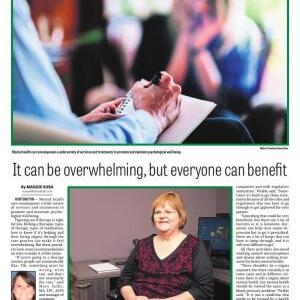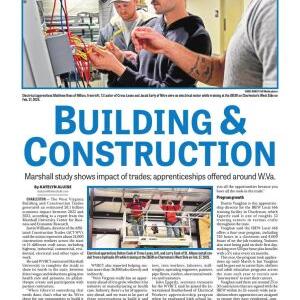HUNTINGTON ├█┴─Í▒▓ąö The Huntington City Council on Monday moved two ordinances that pertain to businesses within city limits to second reading.
They are companion ordinances, said Ericka Hernandez, assistant city attorney. Both are updates because of action taken by the West Virginia Legislature earlier this year.
One ordinance pertains to the business license tax and the business occupancy tax. The ordinance would no longer require a business license for either independent contractors or sole proprietors who neither have a brick or mortar business, nor do they gross $2,500 or more per year.
The ordinance would also update B&O exemptions adding gross income derived from advertising service rendered in the business of radio and television broadcasting, gross income of a nonprofit homeowners├█┴─Í▒▓ąÖ association received from assessments on its members for community services such as road maintenance, common area maintenance, water service, sewage service and security service as well as any business with a gross revenue below $2,500 annually.
Hernandez said earlier this month she does not project the revised exemption to affect tax revenues in the city much.
The ordinance would also more clearly describe when tax returns and payments are considered to be late, and it limits how much collection agencies may charge to the city, Hernandez said.
The second ordinance pertains to home-based businesses. The ordinance, which the city has traditionally called ├█┴─Í▒▓ąťhome occupations,├█┴─Í▒▓ąŁ updates the definition to match state law.
The updated ordinance would not allow signage or advertisement of home-based businesses to be visible from the street, and it sets an administrative review fee, which would replace the annual home occupation fee.
The city previously allowed small signs for home-based businesses. Now state law bans signs that can be seen from the road.
The city has 287 home occupation business licenses that were registered last year, Hernandez said. If the home-based business already has a sign outside of its business it can keep the sign up, but it will technically make the business non-compliant.
As long as those existing businesses that currently have a sign don├█┴─Í▒▓ąÖt change it, the signs can remain and can be repaired, but will still be non-conforming, she said.
The signage restrictions are for home-based businesses, which would include someone├█┴─Í▒▓ąÖs house mostly in a residential area. According to the ordinance, the total amount of floor area of all buildings used for a home occupation cannot be greater than 25% of the total floor area of the principal dwelling unit.
Although there were concerns from council member Tia Rumbaugh on how it would affect home-based businesses, City Attorney Scott Damron said the ban of signs that can be seen from the street will still be enforced under state law if the city would not align itself with the state statute.
Mayor├█┴─Í▒▓ąÖs report
In his mayor├█┴─Í▒▓ąÖs report, Patrick Farrell said the city will join the state auditor├█┴─Í▒▓ąÖs office Open Checkbook system in the coming weeks. Huntington is the only major city in West Virginia that is not a part of the checkbook system, he said. The system will allow anyone to see how the city is spending money.
Farrell also talked about having more disciplined spending. In the fiscal year 2025, the city spent $2.3 million more than it brought in collections, Farrell said. To compensate for the deficit, the city will focus on disciplined spending on things that can make Huntington grow, he said.
├█┴─Í▒▓ąťIf we get more people living here, if we get more people working here, we can collect more money from more people instead of raising taxes,├█┴─Í▒▓ąŁ Farrell said.
Farrell said one way he├█┴─Í▒▓ąÖs doubling down on spending and growing the city is holding people accountable. He said his initiative to go after property owners with delinquent accounts is going well.
The city has already started to see the results of the initiative from the first group of property owners who received letters. The city has received money from property owners that was long overdue, he said.
The city will send out approximately 20 letters a week, Farrell said.
Other business
- The council passed a resolution for the city├█┴─Í▒▓ąÖs technology division to purchase Verkada security cameras to upgrade security in and around City Hall. The security cameras will be purchased by low bidder, Electronic Specialty Company of Dunbar, West Virginia, in the amount of $93,806.24.
- The council passed a resolution to purchase 29 Motorola M500 in-car camera systems for the Huntington ├█┴─Í▒▓ą Department. The cameras will upgrade the current technology in the patrol fleet.
- The council approved an ordinance to issue tax increment financing (TIF) revenue bonds for the Highlawn Redevelopment District in the amount not to exceed $10 million to finance the cost of future public improvement projects. The council approved the creation of the TIF district in April 2023 to facilitate public improvement projects.
- The council also passed resolutions to enter into a contract to provide the city with pool insurance coverage with WV Corp of Roanoke, Virginia, of $693,385 per year and $573,429 pro-rated effective Monday, Sept. 1, through June 30, 2026, a supplemental resolution to finalize the funding for the Huntington Sanitary Board├█┴─Í▒▓ąÖs Wastewater Treatment Plant project.
- The council also approved resolutions to confirm the appointment of Allison B. White to a first term on the Huntington Municipal Parking Board and Matthew G. White to a first term on the Huntington Planning Commission.












